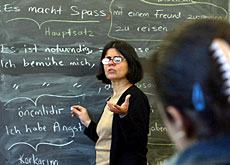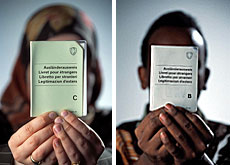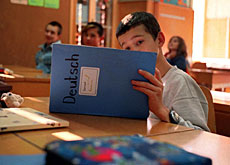Basel proposes language tests for foreigners

Foreigners living in Basel may soon have to pass language and integration tests if they want to remain in the country.
The integration law now under discussion in cantons Basel City and Basel Country is the first of its kind in Switzerland and has been generally well received.
If the law is adopted, foreigners living in Basel will be required to attend a German-language or an integration course in order to receive or extend a temporary residence permit.
European Union citizens, people with permanent residence, and spouses of Swiss citizens will be exempt from the tests, as will asylum seekers. But Swiss who have returned from living abroad could be eligible.
The two local governments say the move is aimed at improving the position of immigrants in Basel.
“[It is so] they can communicate better with people who live here, and they have better chances of getting a job,” Sabine Pegoraro, a member of the Basel Country government, told swissinfo.
“Reactions are mostly positive,” she added.
Pegoraro and Basel City police director Jörg Schild said they hoped that moves to better integrate foreigners would lead to a decrease in violence between different groups.
“[Until recently] we underestimated the problems and importance of integration,” Schild told the “Blick” newspaper.
“With this draft law we are now carrying out pioneering work in Switzerland.”
Two-way street
“Integration is not a one-way street,” said Schild, who has campaigned for the new law. “Both sides have to do something. Whoever lives in our country must play by our rules.”
The Federal Office of Immigration, Integration and Emigration has welcomed the proposal. A spokesman said the draft law was in keeping with a new federal law on foreigners, which is currently being discussed in parliament.
But Beat Meiner, the secretary general of the Swiss Refugee Council, said the two cantons had to be careful how they implemented the new law.
“Sometimes it is necessary to apply a degree of force to ensure that foreigners learn the language, but we have to be aware that some people are not yet in the position where they can do that,” Meiner told swissinfo.
“So individual models will have to be worked out, which take account of the level of education and the personal situation of every individual.”
Pegoraro said that although details still had to be ironed out, the plan was to assess everyone individually before deciding what, if any, courses they needed to follow. She said levels of education would be taken into account.
But she added that it was important that all immigrants learned some of the local language and made an effort to integrate.
“Especially for women, for wives, it is very necessary that they learn the language because they are in contact with schools concerning the children, and the teachers need to talk with the mothers, not just the fathers.”
Who pays?
Pegoraro said that immigrants would be expected to pay for the language and integration courses themselves, but that help could be made available to those that could not afford them.
“Right now migrants pay for the courses themselves, and we want to stay with that. But if it’s an extreme case we can talk about [who covers] the costs,” she added.
The draft law is seen as a test case in Switzerland. If the two Basel cantons are successful in implementing it, others may follow suit.
But Thomas Facchinetti, who is responsible for foreigners in canton Neuchâtel, told swissinfo that a similar law was unlikely to be introduced there.
“On a practical level, the application of the measure poses problems,” he said. “Should we expect a top manager from abroad who joins a pharmaceuticals company in Basel to learn the language?”
Facchinetti said he thought encouragement to learn a language always worked better than threats. He pointed out that in Neuchâtel foreigners were usually prepared to learn French.
“In western Switzerland foreigners are getting better at learning the [French] language, as recent surveys show,” he said.
swissinfo
Consultations on the draft law will take three months.
The law is aimed at avoiding the creation of “parallel societies” in Basel.
It targets immigrants from non-EU-countries.
Foreigners will have to pass a language test in order to remain in the country.

In compliance with the JTI standards
More: SWI swissinfo.ch certified by the Journalism Trust Initiative










You can find an overview of ongoing debates with our journalists here . Please join us!
If you want to start a conversation about a topic raised in this article or want to report factual errors, email us at english@swissinfo.ch.